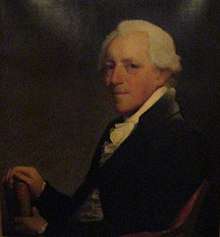Samuel Eliot (banker)
| Samuel Eliot | |
|---|---|
 | |
| President Massachusetts Bank | |
| Personal details | |
| Born |
September 27, 1739 Boston, Massachusetts |
| Died | January 18, 1820 |
| Spouse(s) | Catherine Atkins |
| Relatives | Samuel Atkins Eliot |
| Education | Boston Latin School |
Samuel Eliot was an American banker and businessman from the prominent Eliot family of Boston. He served as president of Massachusetts Bank, and was a highly successful Boston merchant owning and operating what was then the precursor to 19th and 20th century style department stores. At the time of his death, he had amassed one of the largest fortunes in Boston.[1]
Born to Samuel Eliot a Boston publisher, bookseller and Elizabeth Marshall from the West Indies. [2]
Eliot married Mary Pynchon of Boston, and a second time in 1786 to Catherine Atkins, daughter of Dudley and Sarah (née Kent) Atkins of Newburyport, Massachusetts. The second marriage produced 6 children, one being Samuel Atkins Eliot. [3] [4]
Eliot founded the Eliot chair of Greek Literature at Harvard and was a corresponding member of the Society of the United States (1768).[5] In 1806, he was elected a Fellow of the American Academy of Arts and Sciences.[6]
He was the father of Samuel Atkins Eliot and the grandfather of Samuel Eliot, Charles Eliot Norton and Charles William Eliot. His granddaughter Mary Elizabeth Bray (1810–86) was married to Hamburg banker Johann Heinrich Gossler III (1805–1879), owner of Berenberg Bank and a member of the Berenberg-Gossler banking dynasty, and was the mother of Baron Johann von Berenberg-Gossler.[7]
References
- ↑ Henry James (1930). Charles W. Eliot, President of Harvard University. p. 8.
- ↑ Henry James (1930). Charles W. Eliot, President of Harvard University. p. 6.
- ↑ Edward H Cotton (1926). The Life Of Charles W. Eliot. p. 13.
- ↑ Henry James (1930). Charles W. Eliot, President of Harvard University. p. 7.
- ↑ Whitfield Jenks Bell, Patriot-improvers: 1743-1768, American Philosophical Society, 1997
- ↑ "Book of Members, 1780–2010: Chapter E" (PDF). American Academy of Arts and Sciences. Retrieved July 28, 2014.
- ↑ John Albion Andrew, The New-England Historical & Geological Register and Antiquarian Journal, 1869 (July):339